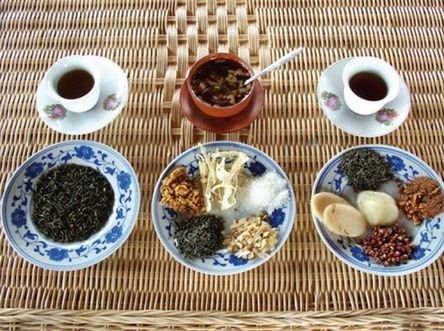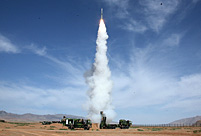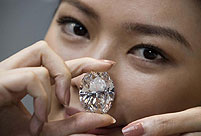 |
| (Yunnan.cn) |
The Bai tea ceremony, Three Course Tea, is most popular among the Bai in the Dali area and is a common sight at festivals and marriages. It is both a cultural ceremony and method of honoring guests. The ceremony is often described in Mandarin as, "Yiku, ertian, sanhuiwei"(First is bitter, second is sweet, and third brings aftertastes).
The first course: Bitter Tea. The first course of tea is called bitter tea, meaning that one will suffer a lot before she/he starts his or her career. The green tea is first baked in a pottery jar for a couple of minutes till it gives out "scorched" fragrance and tealeaves become yellow; some boiled water needs to be added into the jar and when the froth emerges the bitter tea is ready. This course of tea tastes bitter and strong, but refreshing and quenching.
The second course: Sweet Tea. After serving the first course, the host will empty the pot and repeat the procedure right from the beginning. This time, the host will add brown sugar, a special fan-shaped dairy product, and Chinese cinnamon into the handless cup, and then pour the tea into the cup with an amount of 8/10 cup. This course of tea could be "chewed" and it tastes sweet, fragrant and has nourishing efficacy. The tea is fragrant and sweet, symbolizing the meaning of "no sweet without sweat.
The third course: Aftertaste. The brewing procedure is the same as the previous ones, but materials added in the handless cup are changed to honey, popcorn, bunge prickly ash, and walnut kernel with a water amount of 6/10 or 7/10 cup. When drinking this course of tea, one should shake the cup to mix up all those materials and then drink the tea up while it is hot. One will find flavor of sweet, sour, bitter, and pungent in the tea which reminds the taster of bitter comes first, sweet comes second.
The mixture of sweetness, spiciness and bitterness represents all kinds of experience in one's life. One should learn to tolerate everything and take it in stride. Then one can enjoy the beauty of life.
 National Plug In Day celebrated in Washington D.C.
National Plug In Day celebrated in Washington D.C. New model of indigenous surface-to-air missiles testfired
New model of indigenous surface-to-air missiles testfired  118.28-carat diamond to be auctioned in HK
118.28-carat diamond to be auctioned in HK Maternal love under streetlight
Maternal love under streetlight Naked foreign student sits in the middle of a road in Haikou
Naked foreign student sits in the middle of a road in Haikou  Colorful Yunnan: Enjoy the natural beauty
Colorful Yunnan: Enjoy the natural beauty Harbin named Chinese city with most beautiful women
Harbin named Chinese city with most beautiful women For last four students, teacher couple sticks to post on island
For last four students, teacher couple sticks to post on island  When big sport stars were kids
When big sport stars were kids PLA's 38th Group Army conduct training
PLA's 38th Group Army conduct training People mourn for victims of mall attack
People mourn for victims of mall attack The last days of Wan Aihua
The last days of Wan Aihua Highlights at 12th National Games of China
Highlights at 12th National Games of China Beijing Film Academy welcomes freshmen
Beijing Film Academy welcomes freshmen Large mahjong party sets new world record
Large mahjong party sets new world recordDay|Week|Month